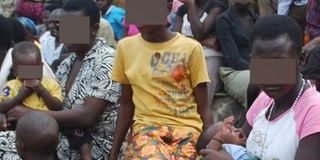Kamuli registers 7,000 teenage mothers in 2018

Teenagers and expectant teenage mothers attend a sensitisation meeting against early marriages and gender-based violence in Kapchorwa District in 2016. The recently released Kamuli District Annual Deliveries Report shows that of 35,509 deliveries in 2018, 7,070 were teenage deliveries. PHOTO BY FRED WAMBEDE
Kamuli- The recently released Kamuli District Annual Deliveries Report shows that of 35,509 deliveries in 2018, 7,070 were deliveries by teenage mothers, Mr Moses Lyagoba, the assistant district health officer in-charge of maternal child health, said last week.
The figures, which are generated from annual reports from the district health office, exclude unreported cases of abortion and deliveries outside the 47 health centres within the district, Mr Lyagoba added. He said all the 47 health centres file their returns to the district which in turn sends them to the Ministry of Health.
While the report concedes that a large proportion of pregnancies among adolescent girls are unintended, it also notes that early motherhood is often associated with the girls being out of school, and it is estimated that 90 per cent of the girls who give birth are married.
Too much freedom
Mr Lyagoba attributed this trend to “lack of parental responsibilities and the tendency of parents to leave their daughters to do what they want”.
“Adolescent girls often have limited or no access to sexual and reproductive health information, education or services. Therefore, they are likely to lack basic information about their bodies, puberty, sexuality and reproduction and to have inadequate access to contraceptive counselling and services,” Mr Lyagoba noted.
He added: “With the proliferation of social media, pornography is at its highest, which exposes these young girls. Also, biologically, their hormones are active.”
The report says of 2,615 mothers who took on family planning, 675 were teenage mothers. Mr Lyagoba said a significant number feared to deliver from health centres.
Mr Sedrine Babalanda, the chairperson of Kamuli and Buyende Districts Girls’ Rights Club, said most teenage mothers dropped out of school and did not risk abortions but seek safe deliveries.
“Most of these girls are rediscovering themselves, have picked up the pieces and returned to school after Convention on the Elimination of all Forms of Discrimination Against Women (CEDAW) and Forum for African Women Educationalists (FAWE) interventions.
CEDAW is an international treaty adopted in 1979 by the United Nations General Assembly. Described as an international bill of rights for women, it was instituted on September 3, 1981 and has been ratified by 189 states.
FAWE is a Pan-African non-governmental organisation which was launched in 1997 to accelerate female participation in education, and aiming at closing the gender gap within the education system at all levels.
“The reason we petition for the quickest passing of the Sexual Offences Bill is to check perpetrators, defilers and parents who benefit from such cases and connive with police to defraud them of their freedom and rights,” Mr Babalanda added.
“I don’t like being a mother but I like my child. I worry about the future and who will buy her things such as soap and clothes that is why when CEDAW and FAWE counselled and gave us options I opted to return to school,” a young mother, who asked to only be identified as Mwajuma, said.
The former Kamuli District chairperson and Girls’ Advocacy Champion, Ms Salaamu Musumba, pointed out that these vices cause trauma, personality disorders and suppress potential for growth and development.
“These teenage mothers need a lot of guidance and counselling as they find themselves stigmatised and rejected often by their immediate family. Let us give them space to speak out, listen to them as young people and open our doors to them so that they are protected, not abused,” Ms Musumba noted.
She said although the Ugandan government has largely progressed in supporting policies to promote girls’ rights, the adolescent sexual reproductive health rights are yet to be realised and that survivors of sexual violence have not realised the benefits of these improved frameworks.
Collective response
Plan International, a child rights organisation, said they are glad that there is a collective response to the protection of girls’ and children rights leading to increased uptake of health services and safe deliveries. They pledged to continue tracking the teenage mothers through their Reach Every Mother and Child programme.
Mr Patrick Emukule, the East and Central Uganda programme manager, said sexual violence against adolescent girls (specifically child marriage and teenage pregnancy) remains a huge and unqualifiable human rights violation in Uganda.
He called for increased understanding, empowerment, advocacy, and crime control strategies through collaborative engagement, building public trust, response and feedback to reduce on the vices.
The Kyabazinga of Busoga, Mr William Nadiope Gabula IV, while declaring this year’s Busoga Kyabazinga Institution theme as “End Child Marriages, Keep Girls in School”, urged the public to work through existing institutions to serve the people, protect children and strengthen parenting values, warning that whoever flouts this will be treated as a social outcast.




